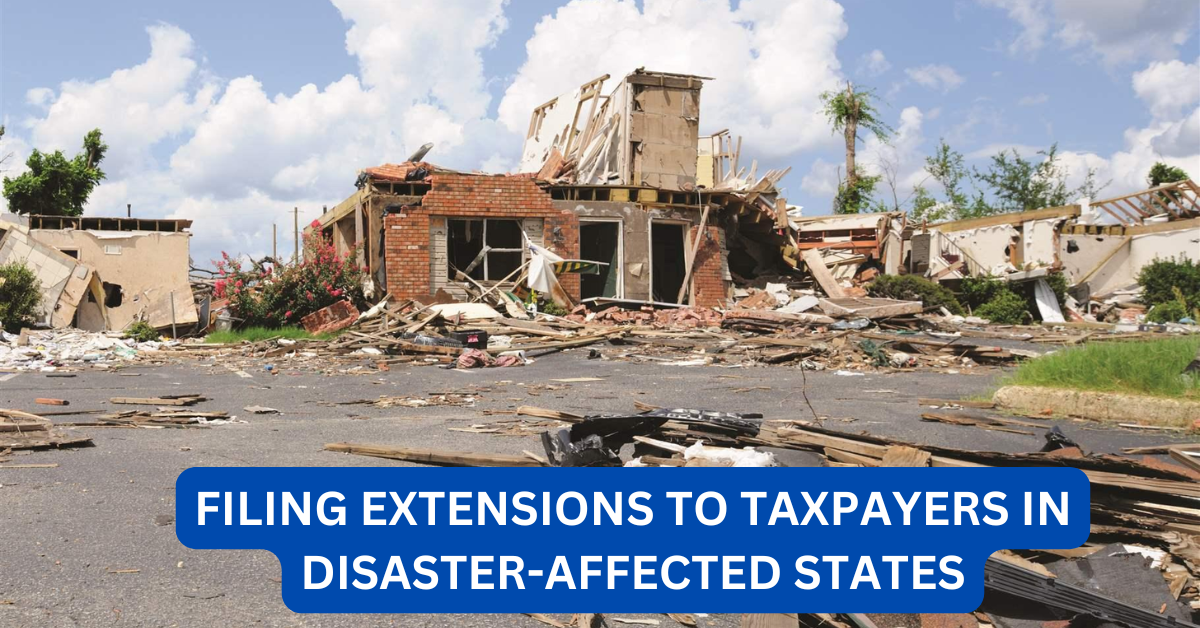The Internal Revenue Service (IRS) has announced extended tax deadlines for individuals and businesses in areas affected by natural disasters. These extensions aim to give taxpayers additional time to file their 2023 and 2024 tax returns and manage other tax-related obligations.
Depending on the state or territory, taxpayers now have until February 3 or May 1, 2025, to submit their 2023 tax returns. Here’s a breakdown of what you need to know about these extensions and who qualifies for them.
Key Dates for Tax Deadlines
Alabama
- Hurricane Helene (September 22, 2024): Deadlines from September 22, 2024, to April 30, 2025, extended to May 1, 2025. (IRS Announcement AL-2024-05)
Alaska
- Flooding (August 5, 2024): Deadlines from August 5, 2024, to April 30, 2025, extended to May 1, 2025. (IRS Announcement AK-2024-08)
Arizona
- Watch Fire (July 10, 2024): Deadlines from July 10, 2024, to February 2, 2025, extended to February 3, 2025. (IRS Announcement AZ-2024-08)
- Flooding (August 22, 2024): Deadlines from August 22, 2024, to February 2, 2025, extended to February 3, 2025. (IRS Announcement AZ-2024-09)
Arkansas
- Severe Storms, Tornadoes, and Flooding (May 24, 2024): Deadlines from May 24, 2024, to October 31, 2024, extended to November 1, 2024. (IRS Announcement AR-2024-01)
California
- Severe Storms and Flooding (January 21, 2024): Deadlines from January 21, 2024, to June 16, 2024, extended to June 17, 2024. (IRS Announcement CA-2024-02)
Connecticut
- Severe Storms and Flooding (January 10, 2024): Deadlines from January 19, 2024, to June 16, 2024, extended to June 17, 2024. (IRS Announcement CT-2024-01)
- Landslides and Mudslides (August 18, 2024): Deadlines from August 18, 2024, to February 2, 2025, extended to February 3, 2025. (IRS Announcement CT-2024-11)
Florida
- Tropical Storm Debby (August 1, 2024): Deadlines from August 1, 2024, to February 2, 2025, extended to February 3, 2025. (IRS Announcement FL-2024-07)
- Hurricane Helene (September 23, 2024): Deadlines from September 23, 2024, to April 30, 2025, extended to May 1, 2025. (IRS Announcement FL-2024-08)
- Hurricane Milton (October 9, 2024): Deadlines from October 5, 2024, to April 30, 2025, extended to May 1, 2025. (IRS Announcement FL-2024-10)
Georgia
- Hurricane Debby (August 4, 2024): Deadlines from August 4, 2024, to February 2, 2025, extended to February 3, 2025. (IRS Announcement GA-2024-07)
- Hurricane Helene (September 24, 2024): Deadlines from September 24, 2024, to April 30, 2025, extended to May 1, 2025. (IRS Announcement GA-2024-08)
Illinois
- Severe Storms and Tornadoes (July 13, 2024): Deadlines from July 13, 2024, to February 2, 2025, extended to February 3, 2025. (IRS Announcement IL-2024-01)
Iowa
- Severe Storms and Tornadoes (April 26, 2024): Deadlines from April 26, 2024, to October 14, 2024, extended to October 15, 2024. (IRS Announcement IA-2024-03)
- Flooding (June 16, 2024): Deadlines from June 16, 2024, to October 31, 2024, extended to November 1, 2024. (IRS Announcement IA-2024-08)
This list highlights only a portion of the IRS disaster declarations. Other states, including Kentucky, Louisiana, Maine, Minnesota, and Texas, also received extensions due to significant weather-related events in 2024. For a complete and detailed list, visit the IRS website or consult official announcements for each state.
Taxpayers in affected regions should note that the extensions apply automatically—no special action is required to qualify. However, taxpayers should keep records of the disaster impact on their financial affairs in case additional documentation is requested.
Eligibility for Extensions
The extensions are granted to taxpayers in regions declared disaster areas by the Federal Emergency Management Agency (FEMA). Individuals and businesses impacted by disasters from late spring to the end of 2024 are eligible.
Key points:
- Taxpayers with a registered address in a FEMA-declared disaster area automatically qualify—no need to file a request.
- Individuals or businesses outside the disaster zone can also apply if they:
- Rely on records located within the disaster-affected area.
- Support relief efforts through recognized government or charitable organizations.
- Those who qualify but live outside the disaster area can contact the IRS at 866-562-5227 for assistance.
Payments and Prior Obligations
It’s essential to note that while the deadlines for filing returns are extended, payments for 2023 tax year obligations due earlier in 2024 are not covered by this extension. These payments were originally required before the disasters occurred.
Special Deadline for Terrorism-Affected Areas
The IRS has also provided relief for taxpayers in regions impacted by acts of terrorism. Individuals and businesses in Israel, Gaza, the West Bank, and nearby areas now have until September 30, 2025, to file and pay their 2023 and 2024 tax obligations.
Accessing More Information
Taxpayers can check the IRS website’s disaster relief section for an up-to-date list of qualifying areas. The IRS provides automatic extensions for affected regions, but taxpayers with unique situations are encouraged to reach out for assistance.
If you are unsure about your eligibility, the IRS offers tools and support to guide you through the process. Taxpayers can also use the IRS2Go app or the Where’s My Refund? tool to track the status of their tax refunds.
Conclusion
These extensions are a crucial step in providing relief to those recovering from disasters. They allow individuals and businesses extra time to manage their finances during challenging times.
This article has been carefully fact-checked by our editorial team to ensure accuracy and eliminate any misleading information. We are committed to maintaining the highest standards of integrity in our content.
Filza specializes in simplifying financial topics for everyday readers. Whether breaking down Canada’s tax guides or U.S. benefits like SNAP and VA Disability, Filza’s relatable writing style ensures readers feel confident and informed. Follow her insights on LinkedIn or reach out via email at shewrites.health@gmail.com.
